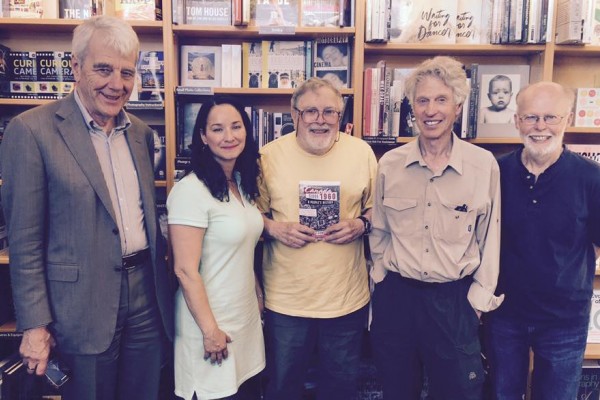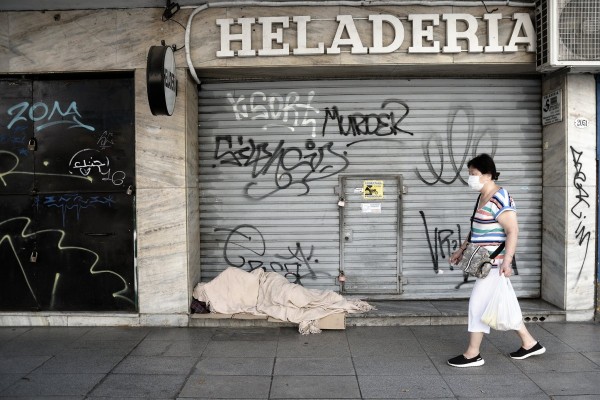From 1919 to the Fight for $15: Working-class organizing in Winnipeg today
“It is as clear today as it was 100 years ago that we need rapid and radical action to uproot the inequalities of capitalism”

Emily Leedham of Fight for 15 and Fairness speaks at a rally organized by Amalgamated Transit Union Local 1505 outside Winnipeg City Hall in August. Photo from People’s Voice.
One hundred years ago, in May-June 1919, thousands of working people from different backgrounds took part in the Winnipeg General Strike. For six weeks, women and men, union and non-union, and craft workers and labourers downed their tools and took to the streets and parks of Winnipeg to protest poverty, war profiteering and capitalist greed. Though the strike was ultimately defeated, it demonstrated the power and potential of working-class solidarity.
Much has changed since 1919, in Winnipeg and elsewhere, but also much remains the same. Workers continue to face many of the same problems: poverty, low wages, inflation and a lack of democracy and political accountability. At the same time, just as they did in 1919, workers today are organizing and fighting for a more just and equal society. The struggle continues.
The centenary of the Winnipeg General Strike is an opportunity to reflect on the labour movement’s past, present and future. One of the first steps in organizing is consciousness-raising, which often occurs when working people share their stories with one another. During the Winnipeg General Strike, workers often gathered in Victoria Park to discuss their concerns and aspirations. In this spirit, I want to share my experiences as a young worker in Winnipeg and discuss my involvement with the Fight for $15 and Fairness Manitoba campaign.
Working-class experience
I started working full-time at Dairy Queen when I was 15. My mother was a single parent, working minimum-wage jobs herself, responsible for three children. There was only so much money to go around. So I started working to pay for some basic things like new clothes, haircuts, school supplies, bus passes and lunches.
At the time, I lived in Calgary, Alberta and made just over $7.00 per hour. As I grew up, I continued to work minimum-wage jobs throughout school and university. I always thought that one day I would get a “real job” with a good salary, benefits, and a pension and be done with minimum-wage service work. As capitalist propaganda teaches us, I truly believed these early jobs were just pit stops on the way to the well-paid life I would have if I worked hard enough.
But as I grew older, I kept working minimum-wage jobs because they were the only ones I could find. At the last retail job that I worked in Manitoba (in 2018), I made $11.35 per hour – the current minimum wage. That’s only four dollars more than what I was earning almost 15 years ago. I realized that, like my mother, many adults live their entire lives working minimum-wage jobs, scraping by, through no fault of their own. This is often due to circumstances beyond their control, like physical or mental illness, domestic violence, citizenship status, disability or discrimination based on race and gender.
I felt angry and frustrated, and I wanted answers. I began to look into why so few workplaces are unionized, and I read many articles about how challenging it is to unionize minimum-wage workers in the retail and service sectors. I felt despair at the injustice where so many working-class lives, including my own, are dictated by bosses. As individuals, working people are pretty powerless.
I experienced a shift in consciousness two years ago when I travelled to Toronto and met an organizer with Fight for $15 and Fairness. The Fight for $15 movement emerged in Ontario in 2015 to pressure the Ontario government to increase the minimum wage. The organizer explained the worker-centric model of the campaign and how it prioritized the voices and participation of women, people of colour, migrant workers and workers not yet unionized.
The Fight for $15 campaign resonated with me – it gave voice to my experiences and frustrations. As soon as I got back to Winnipeg I got involved. I began talking to more organizers and activists, and I read as many books as I could, trying to give myself a crash course in labour history and labour law so that I could begin organizing with other low-wage workers. I also started a radio show on CKUW 95.9 FM, Rank and File Radio – Prairie Edition, as a means to have conversations with labour activists each week.
Bringing the fight for $15 to Winnipeg
On 24 September 2018, a group of unionized and non-unionized workers in Winnipeg, including myself, launched Fight for $15 and Fairness Manitoba. Our grassroots campaign centres around a petition with five demands for not only a $15 minimum wage, but also for better health and safety standards, paid sick and family days, fair scheduling and removing barriers to unionization. We focus on community outreach and capacity building – encouraging workers to collect signatures, start conversations, build networks in their communities and develop organizing skills of their own.
We host monthly events and table and canvass regularly in the community. We often meet people who are so excited about our campaign that when they see us, they call their friends to come sign our petition and ask when our next meeting is. We also meet people who want to get involved in the campaign. Recently, a group of students started organizing at the University of Manitoba. And one fast-food worker, in particular, has collected almost 300 signatures. We have also had people bring their kids to one of our creative events, led by the SparkPoster design collective, where they were able to create their own stickers and buttons. And, we have also been able to garner media attention to challenge the public narratives put forward by the business lobby.
Though this issue affects me personally and I have my own story, this campaign does not belong to me. It is one small part of a larger movement across North America and should belong to all workers who are looking for a means to build solidarity and a collective voice. It can be a place for all of us to learn the incredibly challenging but necessary work of labour organizing.
Challenges
Emily Leedham at left.
Photo from Fight for
$15 and Fairness
Manitoba, Facebook,
October 18, 2018.
However, changing the status quo within the workers’ movement will not be easy. One of our consistent allies in the organized labour movement has been Basia Sokal, the former president of the Winnipeg Labour Council. Basia spoke at our campaign launch and has always emphasized the need for labour to work more with non-unionized workers and community groups. In March of this year, Basia resigned as president of the Winnipeg Labour Council, citing bullying, harassment and undemocratic behaviour from men within labour leadership. Her resignation came as a shock to many. While it is frustrating to see a strong union woman face so many roadblocks, Basia’s resignation has opened up the door, again, to addressing institutional sexism and racism within the labour movement. Our goal with Fight for $15 and Fairness is to bring nonunionized workers into the labour movement, including women, Indigenous, racialized and migrant workers. Basia’s resignation drew attention to the very lack of these voices at the table, in a way that will not be easily swept back under the rug. We need to confront these issues in our efforts to build a stronger workers’ movement today.
The struggle continues
As low-wage, marginalized workers, we are fighting the same fights that many who took to the streets of Winnipeg did 100 years ago, but the stakes of class struggle have escalated due to critical issues such as capitalist-driven climate change. It is as clear today as it was 100 years ago that we need rapid and radical action to uproot the inequalities of capitalism. With Fight for $15 and Fairness, for all its strengths and limitations, we aim to hold the door wide open and welcome people to the work of building a fighting workers’ movement.
Emily Leedham is a writer, labour reporter and community organizer based in Winnipeg. She hosts a weekly labour news show and podcast called Rank & File Radio – Prairie Edition on CKUW 95.9 FM and is an editor for RankandFile.ca. She is also a community organizer with Fight for $15 & Fairness Manitoba.
This article appeared in the Summer 2019 issue of Canadian Dimension (CD Goes Digital).










